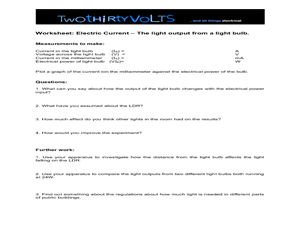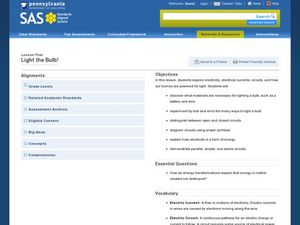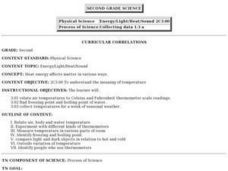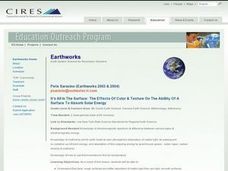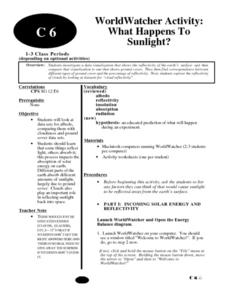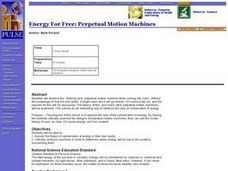Teach Engineering
Thirsty for Gold
In the last portion of the six-part unit, teams perform an experiment with gold nanoparticles to determine which sport drink has the most electrolytes. The nanoparticles are used as chemical sensors and fluoresce in different wavelengths...
LABScI
Kinematics: The Gravity Lab
Falling objects can be brutal if you don't protect your noodle! Scholars explore the motion of falling objects through measuring short intervals to determine if the distance traveled varies with time. Building off of this, scholars...
NOAA
Ocean Zones
How can organisms light up in water? Bioluminescence is light produced in a chemical reaction that can occur in an organism's body. First, learners determine what happens to light/color as you move into the deep ocean. In groups, they...
Curated OER
Leaves, the Sun, and the Water Cycle
As a way to combine life and physical science, or simply as an investigation of plant transpiration, this instructional activity is sure to inspire! Middle schoolers capture the moisture given off by plants that are placed in different...
Star Date
Shadow Play
Three activities make up a solar system lesson that features the sun, its light, and the shadows it produces. Scholars step outside to discover the changes shadows make at different times of day, take part in a demonstration of...
Curated OER
Electric Current: The Light Output from a Light Bulb
Students investigate the energy used by a light bulb. In this electrical energy lesson, students conduct an investigation to explain the relationship between the output of light and the electrical power used by a light bulb.
Curated OER
Plant Growth - Light and Shade
Third graders conduct an experiment comparing plants. In this plant instructional activity, 3rd graders plant seeds and grow two varieties of plant comparing the light needed for it to grow. Students make predictions and...
Pennsylvania Department of Education
Light the Bulb!
Third graders investigate electrical circuits and how light bulbs are powered. In this electricity and power instructional activity, 3rd graders study the vocabulary necessary which includes the different types of circuits, electrical...
Curated OER
Light and Optics
Third graders utilize the scientific method to explain light and optics in this five lessons unit. Through experimentation and discussion, 3rd graders canvass the concepts of light traveling, reflection and refraction.
Curated OER
Science Experiment: Take a Rainbow's Temperature
In this science experiment worksheet, students gather materials and perform an investigation using thermometers and prisms. Students are asked if red is hotter than blue. They answer 6 questions.
Curated OER
Solar Energy Lab
In this solar energy worksheet, students experiment with soil and water to determine if they heat at different rates. They record the temperature of the soil and water under light and in the dark. They graph their data and answer...
Curated OER
What's the Matter? (Experiments)
Students observe a scientific discrepant event, and are then challenged to create experiments to solve the dilemma.
Curated OER
Heat Energy- Temperature
Second graders investigate the meaning of temperature. They determine what happens to a thermometer when the temperature rises or falls. They place thermometers in different classroom locations in order to compare the temperature in a...
Curated OER
Energy Forms
Young scholars explore energy by participating in a science lab in class. For this energy form lesson, students define the different types of energy such as light, mechanical and sound while examining energy measuring tools in class....
Curated OER
Light Travels As A Game
Students identify ways that light can travel and why. In groups, they develop an experiment to show that light can travel because it is a form of energy. They use this information and apply it to other forms of energy to end the lesson.
Curated OER
Do It Yourself: Energy Transfer Lesson Plan
Fifth graders discuss the different types of energy and experiment with tesla coil to show the three types of energy transfer. They write conclusions in their science journal.
Curated OER
Energy Defined
Fourth graders complete activities to study the sources of energy and forms. In this energy lesson plan, 4th graders discuss the origin of energy and define it. Students participate in several experiments to further study energy...
Curated OER
It's All In The Surface: The Effects Of Color & Texture On The Ability Of A Surface To Absorb Solar Energy
Ninth graders examine how dark surfaces absorb more light than light surfaces. They perform an experiment that compares various surfaces abilities to absorb heat, then record and analyze the results.
Curated OER
How the Amount of Solar Energy Absorbed by the Earth is Dependent Upon the Earth's Position
Students investigate the angle of light and how it faces the earth. They conduct a series of investigations with the following two objectives. Students determine if the angle of light is a factor in the absorption of heat. They correlate...
Curated OER
WorldWatcher Activity: What Happens to Sunlight?
Middle schoolers examine a set of data to try to determine the amount of cloud cover. In groups, they make a list of items that reflect light in the atmosphere and how different amounts of it can change the temperature. Using...
Curated OER
Energy for Free: Perpetual Motion Machines
Students observe the "drinking bird" perpetual motion machine and critically examine the designs of other so-called perpetual motion machines. They use this experience to create their own definition of conservation of energy.
Curated OER
Electromagnetic Energy and Its Spectrum
Students explain how electromagnetic radiation travel in space. For this physics lesson, students design and implement an experiment to reduce UV exposure. They discuss and share their findings in class.
Curated OER
Energy Transfer
Students investigate the properties of heated air. They make predictions about what they think makes the wind blow on a worksheet, and conduct two experiments to demonstrate the properties of heated air. Students heat a bottle until a...
Curated OER
Energy in the Form of Calories
Pupils calculate the amount of food calories found in an individual peanut. In small groups, they set up the experiment so that a burning peanut will heat water above it. Using the temperature change and volume of the water they...







